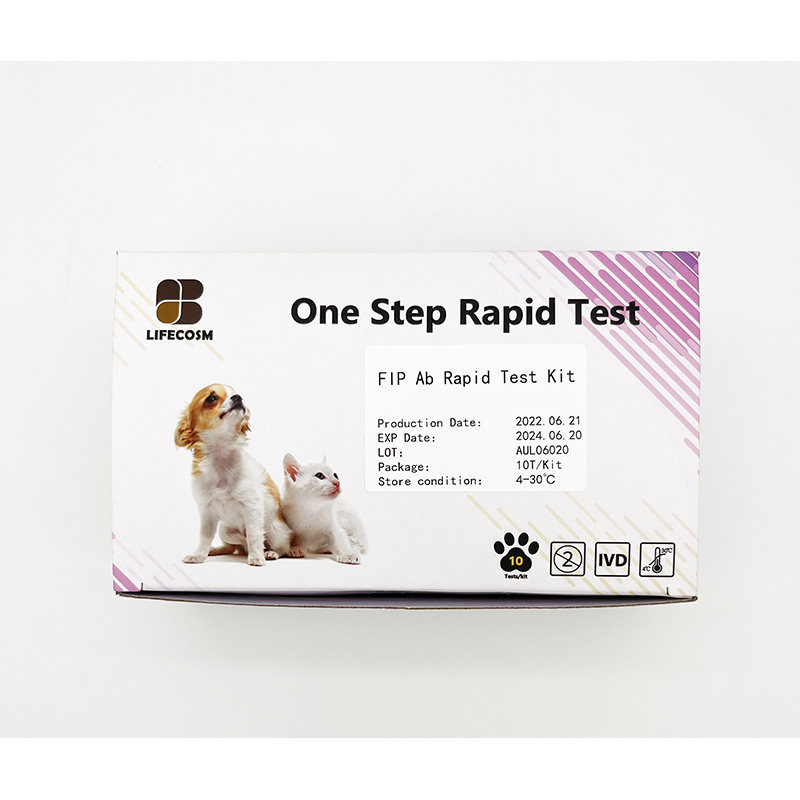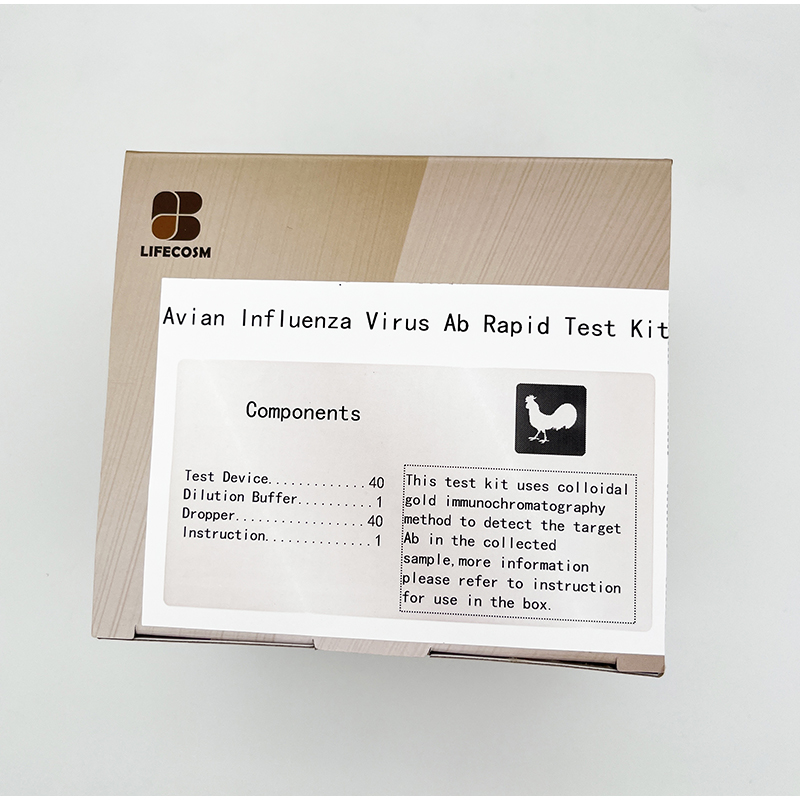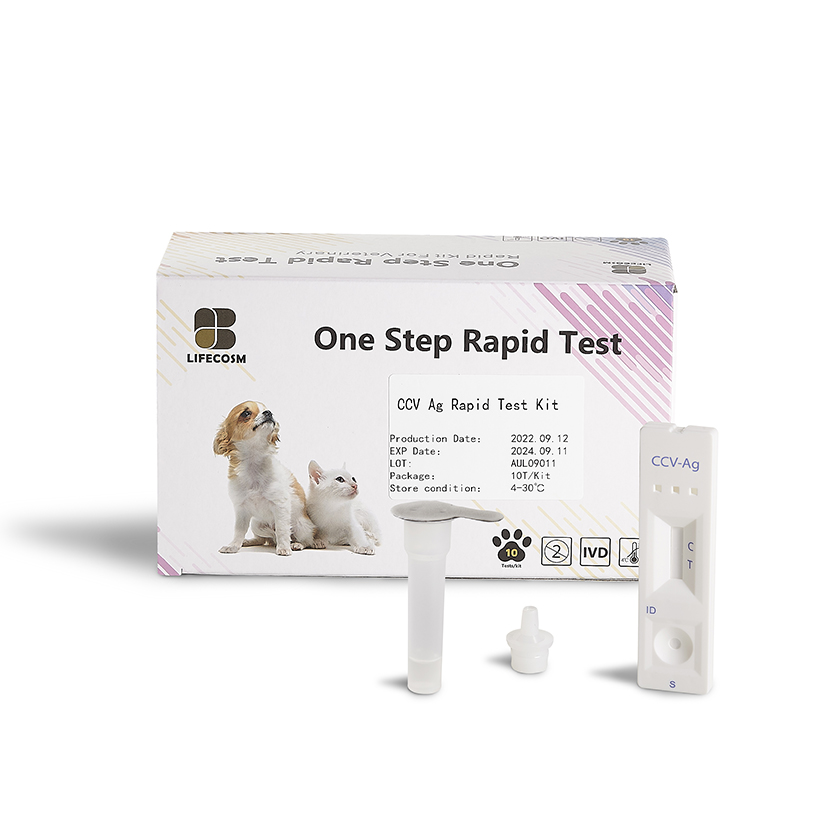
Products
Bv Test Kit - Lifecosm Canine Coronavirus Ag Test Kit to test dog CCV – Lifecosm
Bv Test Kit - Lifecosm Canine Coronavirus Ag Test Kit to test dog CCV – Lifecosm Detail:
CCV Ag Test Kit
|
Canine Coronavirus Ag Test Kit |
|
| Catalog number | RC-CF04 |
| Summary | Detection of specific antigens of canine coronavirus within 15 minutes |
| Principle | One-step immunochromatographic assay |
| Detection Targets | Canine Coronavirus antigens |
| Sample | Canine Feces |
| Reading time | 10 ~ 15 minutes |
| Sensitivity | 95.0 % vs. RT-PCR |
| Specificity | 100.0 % vs. RT-PCR |
| Quantity | 1 box (kit) = 10 devices (Individual packing) |
| Contents | Test kit, Buffer tubes, Disposable droppers, and Cotton swabs |
| Caution | Use within 10 minutes after openingUse appropriate amount of sample (0.1 ml of a dropper) Use after 15~30 minutes at RT if they are stored under cold circumstances Consider the test results as invalid after 10 minutes |
Information
Canine Coronavirus (CCV) is a virus that affects the intestinal tract of dogs. It causes a gastroenteritis similar to parvo. CCV is the second leading viral cause of diarrhea in puppies with canine Parvovirus (CPV) being the leader. Unlike CPV, CCV infections are not generally associated with high death rates. CCV is a highly contagious virus affecting not only puppies, but older dogs as well. CCV is not new to the canine population; it has been known to exist for decades. Most domestic dogs, especially adults, have measurable CCV antibody titers indicating that they were exposed to CCV at some time in their life. It is estimated that at least 50% of all virus-type diarrhea is infected with both CPV and CCV. It is estimated that over 90% of all dogs have had exposure to CCV at one time or another. Dogs that have recovered from CCV develop some immunity, but the duration of immunity is unknown. .
CCV is a single stranded RNA type of virus with a fatty protective coating. Because the virus is covered in a fatty membrane, it is relatively easily inactivated with detergent and solvent-type disinfectants. It is spread by virus shedding in the feces of infected dogs. The most common route of infection is contact with fecal material containing the virus. Signs begin to show 1-5 days after exposure. The dog becomes a “carrier” for several weeks after recovery. The virus can live in the environment for several months. Clorox mixed at a rate of 4 ounces in a gallon of water will destroy the virus.
Symptoms
The primary symptom associated with CCV is diarrhea. As with most infectious diseases, young puppies are more affected than adults. Unlike CPV, vomiting is not common. The diarrhea tends to be less profuse than that associated with CPV infections. The clinical signs of CCV vary from mild and undetectable to severe and fatal. Most common signs include: depression, fever, loss of appetite, vomiting, and diarrhea. The diarrhea can be watery, yellowish-orange in color, bloody, mucoid, and usually has an offensive odor. Sudden death and abortions sometimes occur. The duration of illness can be anywhere from 2-10 days. Although CCV is generally thought of as a milder cause of diarrhea than CPV, there is absolutely no way to differentiate the two without laboratory testing. Both CPV and CCV cause the same appearing diarrhea with an identical odor. The diarrhea associated with CCV usually lasts several days with low mortality. To complicate the diagnosis, many puppies with a severe intestinal upset (enteritis) are affected by both CCV and CPV simultaneously. Mortality rates in puppies simultaneously infected may approach 90 percent
Treatment
As with canine CPV, there is no specific treatment for CCV. It is very important to keep the patient, especially puppies, from developing dehydration. Water must be force fed or specially prepared fluids can be administered under the skin (subcutaneously) and/or intravenously to prevent dehydration. Vaccines are available to protect puppies and adults of all ages against CCV. In areas where CCV is prevalent, dogs and puppies should remain current on CCV vaccinations beginning at or about six weeks of age. Sanitation with commercial disinfectants is highly effective and should be practiced in breeding, grooming, kennel housing, and hospital situations.
Prevention
Avoiding dog to dog contact or contact with objects that are contaminated with the virus prevents infection. Crowding, dirty facilities, grouping large numbers of dogs, and all types of stress make outbreaks of this disease more likely. Enteric Coronavirus are moderately stabile in heat acids and disinfectants but not nearly so much as Parvovirus.
Product detail pictures:
Related Product Guide:
Our workforce through professional training. Skilled professional knowledge, solid sense of service, to fulfill the services demands of consumers for Bv Test Kit - Lifecosm Canine Coronavirus Ag Test Kit to test dog CCV – Lifecosm , The product will supply to all over the world, such as: Bangladesh, South Korea, French, The credibility is the priority, and the service is the vitality. We promise we have now the ability to offer excellent quality and reasonable price items for customers. With us, your safety is guaranteed.
With a positive attitude of regard the market, regard the custom, regard the science, the company works actively to do research and development. Hope we have a future business relationships and achieving mutual success.




